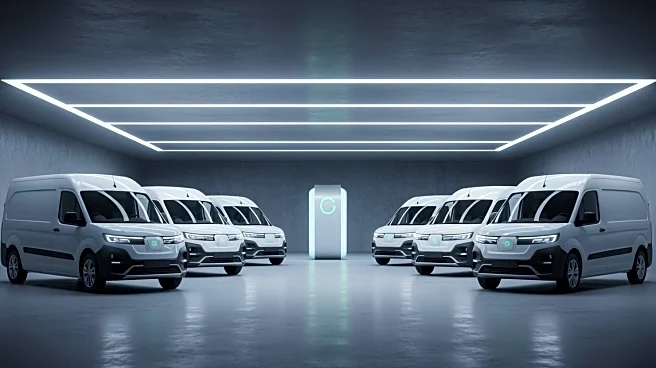What's Happening?
DHL Aviation has announced the introduction of 45 eSprinter electric delivery vans to its fleet in the United States. This initiative is part of DHL's broader strategy to expand its electric vehicle fleet across
the Americas, aiming to improve air quality in major US cities. Greg Hewitt, CEO of DHL Express US, highlighted the company's commitment to electric fleet growth, emphasizing the positive impact on public health. DHL's press statement noted that the new order marks its first use of eSprinters in the US, with plans for further expansion supported by new charging infrastructure in Illinois, Indianapolis, Pennsylvania, and New Jersey.
Why It's Important?
The expansion of DHL's electric vehicle fleet in the US is significant for several reasons. It supports the transition to cleaner transportation methods, which can lead to improved air quality and public health benefits in urban areas. Additionally, DHL's move aligns with global efforts to reduce carbon emissions and promote sustainable business practices. By investing in electric vehicles, DHL is setting a precedent for other logistics companies to follow, potentially accelerating the adoption of electric vehicles in the industry. This shift could also influence public policy and consumer behavior towards more environmentally friendly transportation options.
What's Next?
DHL plans to continue expanding its electric vehicle fleet in the US, with the new charging infrastructure paving the way for future additions. The company aims to electrify 66% of its last-mile delivery fleet by 2030, contributing to its global carbon-reducing roadmap. As DHL increases its electric vehicle footprint, it may influence other logistics companies to adopt similar strategies, potentially leading to broader industry changes. The development of Charging-as-a-Service platforms could further facilitate this transition by providing fleet owners with turnkey charging solutions without upfront infrastructure investments.
Beyond the Headlines
DHL's commitment to electric vehicles reflects a growing trend among corporations to prioritize sustainability and environmental responsibility. This shift not only addresses climate change but also enhances corporate reputation and consumer trust. The integration of electric vehicles into logistics operations may also drive innovation in vehicle technology and infrastructure, leading to advancements in battery range and charging efficiency. As more companies adopt electric fleets, there could be long-term shifts in urban planning and transportation policies to accommodate and support sustainable practices.










